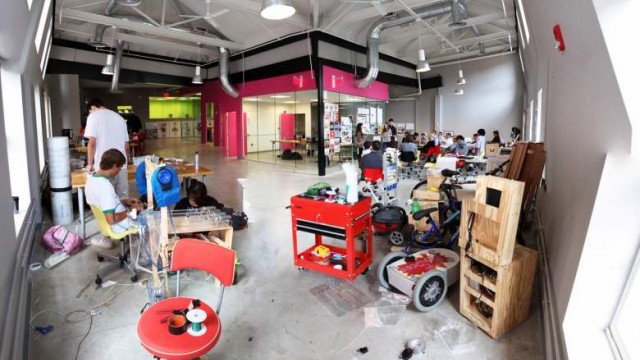Here's How NuVu describes the program:
NuVu is a full-time magnet innovation center for middle and high school students. NuVu’s pedagogy is based on the architectural Studio model and geared around multi-disciplinary, collaborative projects. We basically teach students how to navigate the messiness of the creative process, from inception to completion.
No Courses: Instead, we have studios. Around 12 kids work closely with their 2 coaches on solving big (and small) open-ended problems.
No Subjects: Instead, everything is fused together. Students find themselves moving between a studio that requires them to design a telepresence robot to another that requires them to re-imagine Boston with a cable car system.
No Classrooms: Instead, we have an open space that changes all the time to adapt to the needs of every studio.
No One-Hour Schedule: Instead, students spend two weeks from 9-3 solving one problem.
No Grades: Instead, we have portfolios that document students' design decisions and show their final products.
But can anyone visualize this happening in today's public schools? Project-based learning programs like NuVu are not particularly common throughout the U.S., with notable exceptions like High Tech High and New Tech Network. Most K-12 classrooms in America are fairly new to project-based learning, or don’t offer it at all. Typically speaking, only the most elite schools in the wealthiest neighborhoods can afford to experiment with PBL.
NuVu got its start by partnering with Beaver County Day School in Brookline, Mass., an elite independent school attended by the sons and daughters of Harvard and MIT graduates, which is positioning itself as digitally-savvy and progressive institution. Notably, it was the first U.S. school to make it a requirement for students to take computer programming lessons.
NuVu's program doesn't come cheap. It costs $8,000 per student per trimester. The company offers scholarships, and to Arida's credit, he's looking for ways to involve students from public schools in the area by forging partnerships with neighboring public schools to make NuVu available as an elective.
But for most entrepreneurs, selling schools (particularly budget-strapped public schools) on incorporating PBL programs into their core curriculum is an ongoing challenge.
“We haven’t seen many of these project-based learning programs scale rapidly," said Michael Staton, an investor at education-focused venture firm Learn Capital. "Partnering with schools is fine if you can figure out how to do that efficiently," Staton added. "But most entrepreneurs have no idea."
The crux of the problem, according to Staton, is that most schools are sticking to core subjects and the bell system, which doesn't leave much time for exploratory projects. Outside of school, most students can only access project-based programs online and in their own time. The best known services are DIY.org, an instructional guide for budding makers, and the various project-based learn-to-code courses from Code.org, General Assembly, and Khan Academy. But most high schoolers would tell you that they're already overwhelmed with juggling college admissions, after-school, clubs, volunteering and homework. Good luck adding another project to their plate.
The Tide Is Turning
To make PBL more mainstream, the change may need to come from within. There's a movement afoot to make project-based learning an integral part of every child’s education. Organizations like P21 (Partnership for 21st Century Skills) and Buck Institute are helping to bridge the gap between entrepreneurs, businesses, teachers and state superintendents. P21 partners with representatives in 18 states, including Arizona, California, and Massachusetts, and provides teachers with tools and resources for project-based learning. In addition, the Bill and Melinda Gates Foundation habitually provides funding to PBL schools, particularly those that foster digital skills. These organizations' aim is bring PBL programs into classrooms, rather than expecting students to participate in their free time.
Schools don't need to follow NuVu's model to the tee. In fact, this approach may seem radical, as students do not receive grades or formal examinations and the learning doesn't happen in physical classrooms. But teachers can take inspiration from NuVu and the various interactive online courses. For instance, Muscatine High School in Iowa has found success with its G2 Global Generation Exponential Learning initiative. High schoolers learn math and engineering in classrooms and by making water purification systems, or building statistical models for new bus routes. Younger students at middle school research trash statistics, and participate in oral history projects.
Arida hopes that NuVu's program will pave the way for ed-tech entrepreneurs to launch similar ventures in other states.
"We're presenting a different way to think about education, he said. "Students are empowered to be creative, and actually execute on their ideas. Isn't that the lesson we should be teaching our kids?"
Christina Farr is a San Francisco-based journalist covering health technology. She previously wrote for Venture Beat, The Bay Citizen and SFGate.


